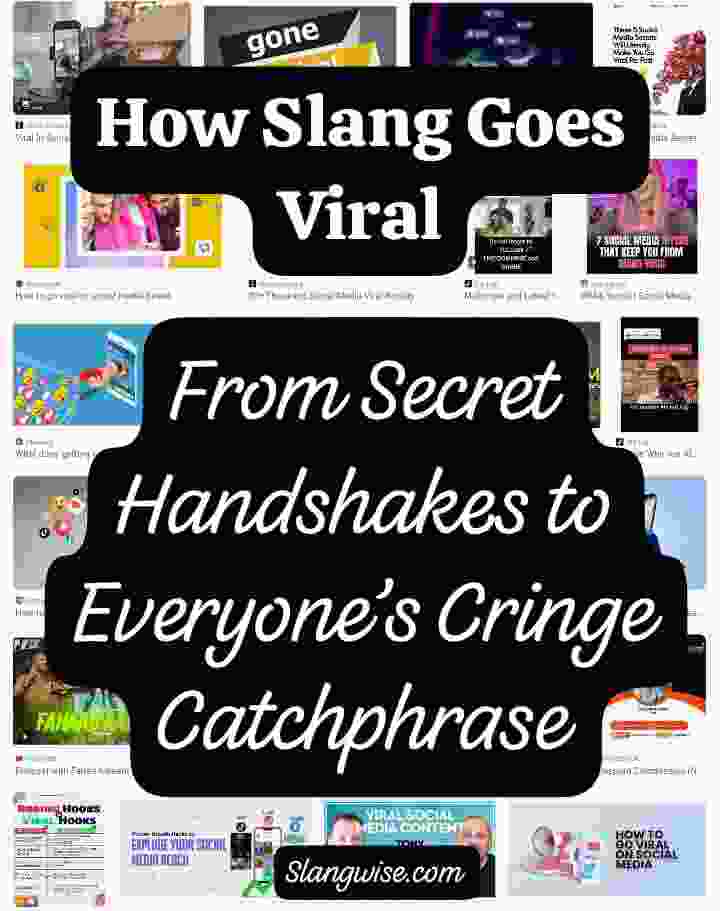Slang doesn’t just happen. It’s born in small groups, gets a boost from social apps, then either keeps living or collapses under the weight of brands and headlines.
In this rewrite I’ll explain the three stages every viral slang term usually goes through, show real examples you’ll recognize, and give clear tips so you can use new words without sounding desperate or dated.
Table of Contents
In a nutshell
- Slang starts in tight communities: Twitch chats, friend groups, niche TikTok scenes.
- Algorithms (TikTok, X/Twitter, Instagram Reels) amplify a catchy word fast.
- Mainstream adoption (brands, news outlets, big celebs) usually kills the word’s insider feel, and shortens its life.
- Tip: learn early, use lightly, and bow out before the word becomes a meme for being old.
Stage 1 — Underground birth: the secret handshake
New slang almost always begins inside a group that wants its own jokes and identity. That could be a gaming clan, a fandom Discord server, a drag-ball community, or a small corner of TikTok.
Example: “rizz.” It began in livestreams and gamer chats to mean charisma or charm. Early users treated it like a badge; if you “had rizz,” you had effortless charm. Initially, the word felt like a private code: if you knew it, you were part of the crowd.
Another example: “girl dinner.” On TikTok, people started posting funny clips of snacky, nontraditional “meals” (think pickles + popcorn + cheese cubes). At first it was a private wink at friends; later it became a way to push back at food rules and body shaming.
Why this stage matters:
- It builds loyalty. Using the word signals membership.
- It keeps the meaning flexible; groups invent layers of meaning that outsiders don’t get.
- It requires no marketing: real use, not ads, makes it stick.
Stage 2 — Algorithmic amplification: the megaphone
If a term is catchy and easy to say, platforms push it. Short clips, remix culture, and repeatable formats make slang spread fast. Algorithms reward novelty and rewatchability, so a weird word can show up on millions of For You Pages in days.
Example: “gyatt.” What began as a misheard shout on a stream became a tag used to celebrate curvy looks. People filmed reaction clips, added the tag, and the platform’s recommendation engine did the rest.
Once a few creators with big followings used it, the word moved from niche to mainstream youth feeds.
Why algorithms love slang:
- Short words are perfect for captions and punchlines.
- Remixing (duets, stitches, reaction videos) creates many fresh contexts for the same phrase.
- Each share loops back into the algorithm, views create visibility, visibility creates more views.
For more information, here’s a useful perspective from Cornell University on how slangs spreads and changes.
Stage 3 — Mainstream adoption: the bittersweet finish
When a word reaches magazines, TV, or brand campaigns, it usually loses its private vibe. That’s when original users often abandon it, because the word no longer marks exclusivity.
Mainstream adoption does have upsides: it’s how a small group’s culture gets recognized. But it also speeds up the slang’s half-life; many viral words peak and fade within months.
Examples:
- Slay — This began in the ballroom scene as a fierce shout-out for an amazing performance. Later, pop stars and general media mainstreamed it. By the time big retailers used it in ad copy, the term had lost some of its edge for the communities who invented it.
- Cheugy — Coined to poke fun at certain millennial tastes, it got magazine articles and think pieces. That exposure made it seem old almost overnight.
Why tracking slang matters
Slang is cultural data. A trending word tells you what people find funny, what they admire, and what they’re rebelling against. When a silly phrase becomes a serious conversation (for example, a term tied to body positivity or identity), it reveals bigger social shifts.
Watching slang can help creators, teachers, parents, and writers stay relevant — and more importantly, respectful of the people who made the words in the first place.
How to spot a rising slang word
- It appears in niche places first. Twitch, small TikTok accounts, particular subreddits, or fandom Discord servers.
- It’s short and repeatable. One- or two-syllable words travel faster.
- Creators remix it. If people make many different video types around the same word, it’s gaining life.
- It gets used as a tag. Hashtags and challenge-style formats help acceleration.
How to use slang without wiping out
Using new language is a skill. Here are practical tips:
- Lurk first. Watch how original users say it. Context matters more than a single definition.
- Use sparingly. One well-placed phrase beats trying to be the slang ambassador at a meeting.
- Credit your sources. When possible, nod to the community or creator where you heard it. That shows respect.
- Avoid brand-speak. If a big chain already uses the term in ads, it’s probably past its peak.
- Know the tone. Some terms are playful, others are pointed. Using a playful term in a serious moment can be tone-deaf.
Example:
- “He has total rizz — he walked into the room and had everyone laughing.”
- “That video is pure girl dinner energy — pickles and chips and zero shame.”
- “She got the look — absolute gyatt!” (Used here as a compliment in casual speech.)
When to retire a word
If a slang term starts appearing on mass-market T-shirts, corporate tweets, or in mainstream TV ads, treat that as your green light to stop using it casually.
The word either becomes a lasting addition to the language (rare) or it becomes a buzzword nobody under 25 wants to touch.
Examples that illustrate the full life cycle
- From chat to headline: “rizz” began in livestreams (Stage 1), exploded on short video platforms as creators built jokes and challenges (Stage 2), and showed up in articles and celebrity posts (Stage 3). Early users still use it, but many cringe at late adopters.
- A term that changed meaning: “girl dinner” started as a private joke about snacky meals, then became a social media trend and a conversation about food rules. It moved from joke to statement: an example of slang becoming social commentary.
- A short-lived viral spark: “cheugy” was a quick cultural critique that burned bright in think pieces and social feeds: and then cooled once journalists and brands overused it.
Respect the communities that create slang
Many popular terms come from marginalized or creative communities (drag scenes, gaming cultures, queer spaces). When using those words, consider where they came from. Giving credit or learning a bit about the origin is basic respect and makes your usage more informed.
Quick checklist: smart slang use
- Watch where it starts.
- Wait until you understand the tone.
- Use it sparingly and in the right company.
- Credit originators when it’s meaningful.
- Move on when it goes mainstream.
Final thought
Slang is a living part of language. It’s messy, creative, and often hilarious. The words that survive do so because they fill a gap; a joke, a feeling, an identity. If you want to stay fluent in internet language, keep watching, keep listening, and give credit where it’s due.
Use new words to connect, not to perform. That way, you’ll enjoy the ride and avoid the cringey wipeouts when trends go mainstream.
About the author
I’m Agboola John, founder of Slangwise.com. I study internet language, hunt down catchphrases, and write about what they tell us about how people relate. When I’m not tracking a new term, I’m gaming with friends or scribbling slang notes over coffee.

